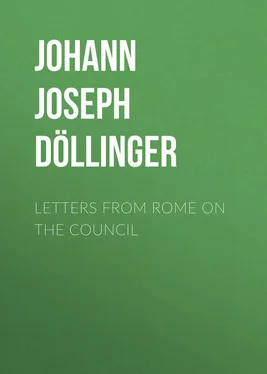Johann Döllinger - Letters From Rome on the Council
Здесь есть возможность читать онлайн «Johann Döllinger - Letters From Rome on the Council» — ознакомительный отрывок электронной книги совершенно бесплатно, а после прочтения отрывка купить полную версию. В некоторых случаях можно слушать аудио, скачать через торрент в формате fb2 и присутствует краткое содержание. Жанр: foreign_antique, foreign_prose, на английском языке. Описание произведения, (предисловие) а так же отзывы посетителей доступны на портале библиотеки ЛибКат.
- Название:Letters From Rome on the Council
- Автор:
- Жанр:
- Год:неизвестен
- ISBN:нет данных
- Рейтинг книги:3 / 5. Голосов: 1
-
Избранное:Добавить в избранное
- Отзывы:
-
Ваша оценка:
- 60
- 1
- 2
- 3
- 4
- 5
Letters From Rome on the Council: краткое содержание, описание и аннотация
Предлагаем к чтению аннотацию, описание, краткое содержание или предисловие (зависит от того, что написал сам автор книги «Letters From Rome on the Council»). Если вы не нашли необходимую информацию о книге — напишите в комментариях, мы постараемся отыскать её.
Letters From Rome on the Council — читать онлайн ознакомительный отрывок
Ниже представлен текст книги, разбитый по страницам. Система сохранения места последней прочитанной страницы, позволяет с удобством читать онлайн бесплатно книгу «Letters From Rome on the Council», без необходимости каждый раз заново искать на чём Вы остановились. Поставьте закладку, и сможете в любой момент перейти на страницу, на которой закончили чтение.
Интервал:
Закладка:
I understand the feeling of the Roman clergy, and their indignation at these stubborn Hyperboreans. It is as though one wanted to snatch from the hands of the thirsty wanderer, who, after long toil, had at length reached the fountain, the cup he was raising to his lips. With Infallibility, as it is now defined and made clear as the sun at noonday by the Jesuits, all resistance is broken, every attack triumphantly parried, every end brought within reach. If the Curia once becomes by this means the horny Siegfried, no vulnerable point even in the back will be left. The Jesuit Schrader, in his book on Roman unity, has proved that every act and every ordinance of the Pope is infallible. For, as he says, “all Papal measures, as regards their truth, belong to the order of faith, or morals, or law. All decrees, whatever their subject, always contain a true doctrine, whether speculative, moral, or juridical. But the Pope is infallible in the order of truth and doctrine, and therefore in all his decrees.” Your readers will believe I am ridiculing or calumniating the valiant Jesuit, who shines at present as a star of the first magnitude in the theological heavens of Rome; but I have only given a faithful translation, as any one may ascertain for himself. That is the logic which prevails here, and which no Roman cleric doubts to be of triumphant force.
Dec. 30. – The second Session of the General Congregation on the Schema took place yesterday. About a third of the hall had been cut off by a partition, so that the speakers could be somewhat better understood. Among the five speakers, who, like the seven that had preceded them, pronounced for the rejection of the Schema , Strossmayer, and Ginoulbiac, of Grenoble, who is considered the best theologian among the French Bishops, commanded most attention. The Schema was again censured for going much too far in its statements and condemnations, and it was shown that the Council, by accepting it, would enter on a wholly new path, widely different from that of the earlier Councils, where the Church would be forced into constantly narrower definitions, until a complete dogmatic philosophy, stiff and rigid, had been formalized. Strossmayer also observed on the formula of promulgation selected by Pius, which represents the Pope as a dogmatic lawgiver, and the Council as a mere consultative body called in to assist him, that it is an unheard-of innovation, departing from all conciliar traditions. This led to an opposite statement by Cardinal Capalti, one of the Presidents, and a reply from Strossmayer. As yet no single one of the host of 500 has said a word in defence of the Schema . The excitement is, as may be conceived, great. That even Rauscher came forward against the Schema created the more sensation, as it was he who brought its author, Schrader, to the University of Vienna.
Eighth Letter
Rome, Jan. 8, 1870. – One month is now gone by without any result, or, as many here say, simply wasted. The first real Session, on January 6, went off without any single decree being published. It has produced a very painful impression generally, that, for the obvious purpose of something to do, the unmeaning ceremony has been adopted of swearing to the profession of faith which every Prelate had already sworn to at his ordination and at other times. The question was inevitably forced on men's minds whether this profusion of superfluous swearings, in an assembly of men on whose orthodoxy no shadow of suspicion had been cast, was at all fitting or reconcilable with the Scriptural prohibition of needless oaths. But the Session had been announced, and the Opposition Bishops, contrary to expectation, had found a great deal to censure in the Schema in general and in detail, so that in four General Congregations nothing had been effected. The simplest plan would have been to defer the Session, and anywhere else that course would have been followed. But in Rome? That would have been a de facto confession of having made a mistake, and it is here a first principle that the Curia is always right. So they had 747 oaths taken, and thus the Solemn Session was held.
It is exceedingly convenient to have to deal with a majority of 600 Prelates, who are simply your creatures, obedient to every hint, and admirably disciplined. Three hundred of them are still further bound to Pius ix. by a special tie, for they are indebted to him, as the Civiltà of January 1 reminded them, for both food and lodging, “sono da lui alloggiati e sostentati e assistiti in tutto il bisognevole alla vita.” Nor does that journal fail to point to the extreme poverty of many of the Bishops or Vicars-Apostolic, drawn hither from Asia, Africa, and Australia; even among the European Bishops it calls many “poverissimi.” Who has paid their travelling expenses, it says not. The Civiltà may be easy; none of them will swell the ranks of the Opposition, or attack the Schema , or refuse their votes and acclamations to the infallibility of their benefactor. And then the Civiltà has another powerful factor to rely upon; it says, and confirms what it says by the words used by the Pope at the Centenary, June 27, 1867, that from the tomb of St. Peter issues a secret force, which inspires the Bishops with a bold and enterprising spirit and great-hearted decisions. If I rightly understand the Civiltà , it means that for many Bishops it is a risk, and requires a lofty courage, to vote for Papal Infallibility here in Rome, while the clergy and laity of their own dioceses, excepting a few old women of either sex, never hitherto knew, or wished to know, anything of this Infallibility, and the prevalent belief has always been that the business of Bishops at a Council was only to bear witness to the faith and tradition of their Churches, not to construct new dogmas strange to the minds of their flocks. “Nous avons changé tout cela,” thinks the Roman journal, and therefore is the Council held in St. Peter's, and not in the Lateran, that the “secret force” may take full effect. Certainly there is no lack of secret forces here, They are in full activity; there is an address being hawked about, praying the Pope to take up the Infallibility question at once, and put the Council in a position to vote upon it. This time the movement originated with two German Bishops, Martin of Paderborn and Senestrey of Regensburg. Slender causes and great effects! When the pond is full, a couple of moles can produce a flood by working their way through the dam. Both of these men have become perceptibly impatient at the obstinate and rebellious disposition of their German and Austrian colleagues, and are seeking to hasten the day, when, with the new dogma in their hands, they may triumph as willing believers over the forced belief of their brethren, only converted at the last moment. The address seems to have flashed suddenly upon the world, for – so said Mermillod and the rest of the initiated – its very existence was hardly known of; and it had 500 signatures. It was not shown to Bishops of notoriously anti-Infallibilist sentiments, but no labour is spared with the doubtful, and others who have not yet declared themselves, so that it is quite possible 600 signatures may be scraped together. Papal Infallibility is here limited to cases where the Pope addresses his dogmatic decision to the whole Catholic Church. 28 28 “Supremam ideoque ab errore immunem esse Romani Pontificis auctoritatem, quum in rebus fidei et moram ea statuit ac præcipit quæ ab omnibus Christi fidelibus credenda et tenenda, quæve rejicienda et damnanda sunt.”
That was Bellarmine's view, and it would certainly offer many advantages; for all difficulties and objections drawn from the first twelve centuries of Church history would be cut off at a stroke, as it is notorious that no Pope during that entire period addressed any decree on matters of faith to the whole Church. The idea never occurred even to a Gregory vii. or Alexander iii. or Innocent iii. The two last only issued decrees at the head and in the name of General Councils. Boniface viii., in 1302, was the first who in the title addressed his Bull Unam Sanctam to the whole Christian world. This Bull therefore, which makes the Pope king of kings and sole lord in political as in religious matters, would indeed be covered with the shield of Infallibility, and we should have a firm and immoveable foundation for the policy and civil law both of the present and the future. At the same time the various hypotheses and attempted denials rendered necessary by the case of Pope Honorious would be got rid of at one blow. Only this little difficulty would remain: how it came to pass that the Popes, who only needed to prefix the word “Orbi,” or “Ecclesiæ Catholicæ,” to their decrees, in order to make them infallible and unassailable, so persistently despised this simple means, and thereby tolerated or produced so much uncertainty in the world? All their decrees before 1302, and most of them since, are addressed to particular individuals or corporations, and therefore fallible.
Интервал:
Закладка:
Похожие книги на «Letters From Rome on the Council»
Представляем Вашему вниманию похожие книги на «Letters From Rome on the Council» списком для выбора. Мы отобрали схожую по названию и смыслу литературу в надежде предоставить читателям больше вариантов отыскать новые, интересные, ещё непрочитанные произведения.
Обсуждение, отзывы о книге «Letters From Rome on the Council» и просто собственные мнения читателей. Оставьте ваши комментарии, напишите, что Вы думаете о произведении, его смысле или главных героях. Укажите что конкретно понравилось, а что нет, и почему Вы так считаете.












